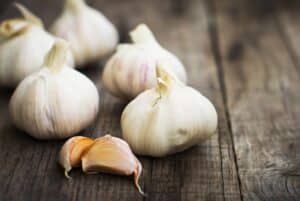One of the biggest advantages of eating vegan meals is being able to reduce your carbon emissions to help the environment. By now, eating less or no meat to reduce our carbon footprint is pretty cemented in the green living lexicon. The vegan carbon footprint is far smaller than other diets.
The Guardian even estimates that giving up beef can lower your carbon footprint more than using a car. Red meat uses 28 times more land and 11 times more water than pork or chicken. Red meat also produces five times more climate change emissions. Taken a step further, red meat requires 160 times more land and produces eleven times more greenhouse gasses than vegan staples like potatoes, wheat and rice.
The reasons not eating meat is so much better for carbon emissions exist on several levels. On one level, not eating meat takes one wasteful step out of the food production equation, and that’s the fact that we feed plant-based resources to our food in order to make it food. We’re using land and resources to grow our food’s food. On another level, it then takes even more land to house animals while they mature. On a third level, it takes more carbon emissions to prepare, cook and ship meat and other animal products due to the complexity of butchering and keeping products fresh.
Yet even beyond that, you may be wondering what the lowest carbon emission vegan foods are. Surely it takes more energy to prepare a veggie burger than to simply grow an apple.
Eatlowcarbon.org gives a ranking for each popular food based on its CO2 emissions. According to the site, each food is given a score based on how much carbon it produced throughout its lifecycle, from production to shipment to cooking. Vegan carbon footprint scores go from three-bean soup sitting at a score of 54 to Indian feast at 5,370. Below are some of the lowest carbon emission vegan foods.
- Three bean soup: 54
- Lentil soup: 54
- Falafel: 80
- Seasonal, steamed vegetables: 83
- Seasonal fruit: 84
- Vegetarian chili: 86
- Toast and jam: 103
- Rice and beans: 129
- Hummus: 132
- Steel cut oats: 144
- Vegetable curry: 260
- Vegetable stir-fry: 305
- Spaghetti with marinara: 352
- Garden salad: 401
This gives you a good idea of the vegan carbon footprint and how carbon emissions are ranked based on different types of foods. Complexity of the food preparation can raise the score, such as needing to boil water for spaghetti or having to source tons of different ingredients. You can visit eatlowcarbon.org to explore more food options.
Where things get really interesting is how much carbon emissions are involved in tofu. Tofu has a surprisingly complex preparation process involving cleaning, soaking, grinding, filtering, boiling, coagulation and pressing. Tofu curry sits at a 1,295 carbon score (as opposed to the 260 vegetable curry score), tofu stir-fry is at 1,340 (as opposed to the 305 vegetable stir fry) and a spinach and tofu salad is at 552 (as opposed to the 401 garden salad). That being said, tofu is still far lower than a 2,839-point roast beef sandwich.
Other than closely categorizing your food by scores, another way to radically reduce your vegan carbon footprint is to buy your food locally. That reduces the carbon emissions it takes to ship your food. Hit up farmers markets to buy what’s local and in season. Support any local grocers that may source their food from local farmers. And when in doubt, go ultimately local and try growing your own veggies in a garden if you have the space and the means.






Comments
No Comments